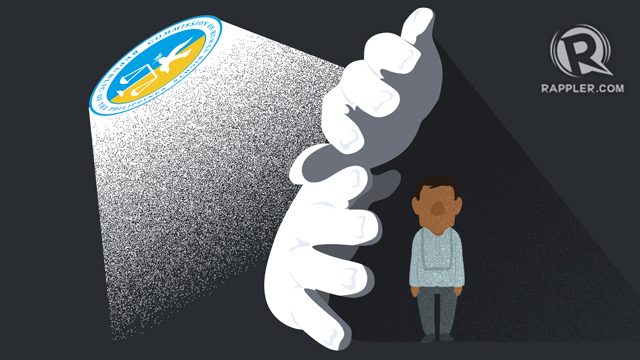SUMMARY
This is AI generated summarization, which may have errors. For context, always refer to the full article.
![[Newspoint] A subhuman perspective on human rights](https://www.rappler.com/tachyon/r3-assets/612F469A6EA84F6BAE882D2B94A4B421/img/D50E797189D44466921883A2E35102A0/vergel-santos-headshot-150px.jpg)
Congressman Rodante Marcoleta has become an instant spectacle. I had been reading about him in the news, but it was not until he appeared on television, close up, mouth running, that I knew exactly why.
He upstaged his oppositionist colleague Edcel Lagman, but only because Lagman was just too predictable: knowledgeable, logical, articulate. If Marcoleta himself possessed any of those qualities, he didn’t show it when I watched him.
Also, he came to Congress not by winning a regular district vote, as did Lagman; he came through the “party-list system”, which allots congressional seats to certain national, regional, and sectoral organizations. He has switched representations between terms, but no one is fooled: he has always served first the interests of the Iglesia ni Cristo so that wherever his vote goes reflects his sect’s leanings.
Now Marcoleta sits in Congress as a devotee, doubtless with his sect’s blessing, of Speaker Pantaleon Alvarez and, further on high, President Duterte. In fact, it was in order that their will be done that he was cast in the role that I’m writing about here. (In the Senate, that role – majority mouthpiece – goes to Manny Pacquiao, but only when the majority leader himself, Tito Sotto, doesn’t feel up to it and motor-mouth Dick Gordon is hoarse).
Marcoleta got the lead role in the emasculation of the Commission on Human Rights and performed it to such perfection he deserves an Espenido medal, the sort Duterte pins on chests that thump most servilely for him. Marcoleta’s moment lay in his ringing sponsorship of a motion to cut the annual budget of the Commission on Human Rights to a thousand pesos as punishment for not defending Duterte’s own human rights against international denunciations of his war on drugs.

To be fair, that subhuman perspective on human rights is no Marcoleta original; it had been a running absurdity, passed from Duterte to Alvarez to him, for final mouthing, though doubtless he proved more than equal to the task.
Marcoleta proceeded from two assumptions and, like a good Duterte clone, stuck with them, however unsound (I did not actually see Lagman roll up his eyes as Marcoleta ludicrously pressed on, but I could swear he was struggling to stop his eyes doing that). The first assumption is that Duterte’s war on drugs is a righteous war.
How can a war targeting 4 million humans for extermination be righteous? Thousands, in fact, have been killed – estimates go to as high as 12,000 in Duterte’s first year alone in office. Need anything more be said? Could anything be said at all for the war on drugs that would justify, even in the vaguest sense, Marcoleta’s protestation of human rights for Duterte? Duterte, indeed, has the strangest idea of fixing things: he is fixing humanity the same way he is fixing Marawi – by killing it.
The second assumption fits human rights unconditionally into the most basic of all democratic principles – equality for all. It pursues the point that the Commission on Human Rights has unfairly excluded the President from the equation.
Taken out of theory and put in the proper constitutional and moral perspective, the argument explodes in its face. The relationship intended in the equation is an adversarial one: official power vs citizen rights; in personal representation, Duterte and his police vs the likes of Kian delos Santos, the 17-year-old apparently mistakenly targeted and killed in the war on drugs.
On the other hand, the role intended for the Commission on Human Rights is an equalizing one, precisely in acknowledgment of the not only superior, but potentially conspiratorial, power of the state and its agents over its citizens. In a case like Delos Santos’, the Commission is expected to conduct an evidence-gathering inquiry into suspicions of summary execution and, if warranted, act as an advocate.
At any rate, amid a huge public uproar, the House retreats and restores the Commission’s budget. And, in an attempt to save face and convince itself it has won some measure of victory, it announces that Chairman Chito Gascon has agreed to “broaden” the scope of his Commission’s inquiries – but not to include Duterte among its clients, as Marcoleta was bargaining for. – Rappler.com
Add a comment
How does this make you feel?
There are no comments yet. Add your comment to start the conversation.